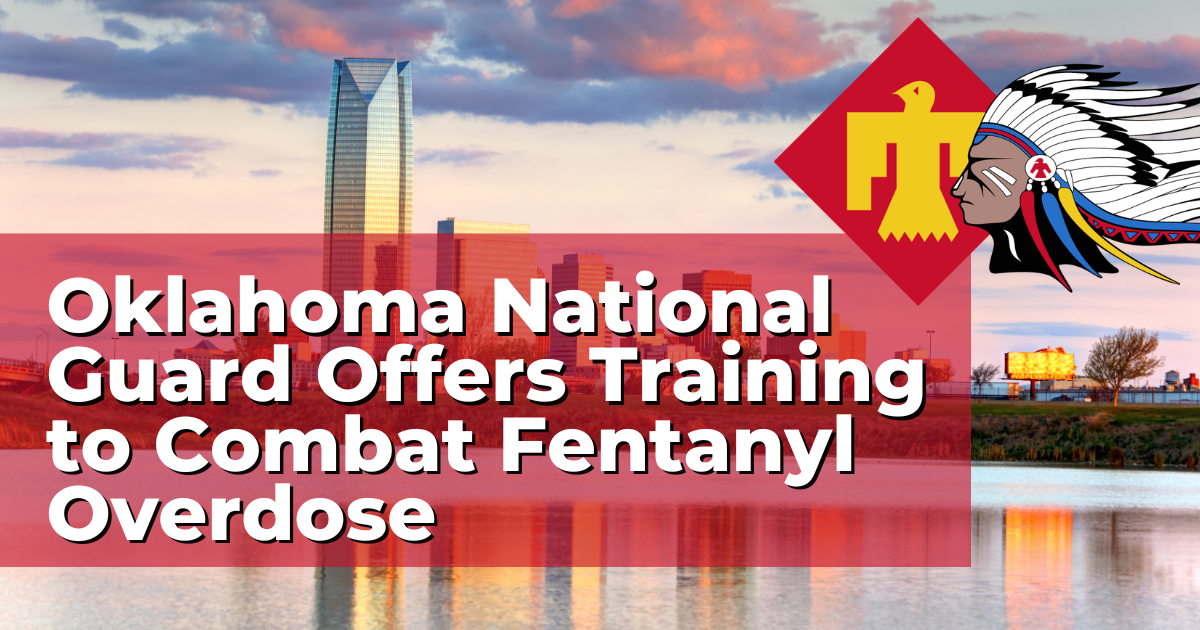With fentanyl overdoses rising at a skyrocketing rate, various Oklahoma and federal agencies are taking steps to try and decrease overdose deaths. This includes teaching first responders about fentanyl and how to keep the public safe from the drug. These specialized training sessions will help groups like the 63rd Civil Support Team (CST), a division of the Oklahoma National Guard, to combat the drug as it penetrates the state’s black market. Well-trained agencies can successfully assist the Drug Enforcement Agency (DEA) and Federal Bureau of Investigation (FBI) in their efforts at combating fentanyl.
Sergeant Douglas Engel, a leader in the 63rd Civil Support Team, is one of those who learned from the FBI and DEA and, in turn, shared his own specialized knowledge with them. “Capabilities of CST will help other first responding agencies, and particularly law enforcement, to get ahead of the rising tide of fentanyl,” he said, “to help them figure out where the fentanyl is coming from and to be able to help mitigate that threat before it becomes so prevalent that it is widespread.”
National Guard members learned how to use equipment for identifying opioids and the chemical makeup of opioid drugs. The 63rd CST also shared some of their technology to demonstrate the capabilities they had in identifying opioids.
“We are supporting [this training] by bringing some of our equipment out today, showing our resources and what we can do, as well as giving other first responders an opportunity to…utilize some of our equipment,” Sgt. Engel said.
Oklahoma state officials and law enforcement agencies hope that by learning how to prevent the scourge of fentanyl from destroying their communities, they can turn around and teach the public about the dangers of such a harmful drug to save lives in their communities.
The State of Drug Abuse in Oklahoma
According to the Oklahoma State Department of Health, over 3,300 people died from an overdose between 2016 and 2020. Each week, 94 Oklahomans are hospitalized from a drug overdose, with nearly half of them being from unintentional overdoses. The Substance Abuse and Mental Health Services Administration’s 2018-2019 National Survey on Drug Use and Health shows that 0.54% of Oklahomans are in the midst of a pain reliever use disorder, while at least 2.15% of Oklahomans have some kind of illicit drug use disorder.
How to Respond to an Overdose
Often, the first responder in an opioid overdose situation is a friend, family member or someone who just happened to be there. This is why it’s important for citizens, not just officials, to learn how to respond to life-or-death situations when fentanyl is involved. When someone overdoses on an opioid, the first step to take is to call 911. Once 911 has been contacted, an opioid antagonist drug should be utilized if available, like Narcan/naloxone. These kinds of drugs reverse the effects of opioids and save lives.
CVS Pharmacies has a guide for responding to an overdose with Narcan on its website:
- Identify the Overdose — Opioids will suppress the body’s breathing rate. If you notice this, try calling the person’s name or rubbing your knuckles on their chest. If there is no response, the person may be experiencing an overdose.
- Call 911 — It is important to get professional help as soon as possible. Make sure to call 9-1-1 and give a clear address and location. Tell the operator that the person is unresponsive and not breathing or having difficulty breathing.
- Give Rescue Breaths — Giving a person who is experiencing an overdose basic CPR can be an effective way to deal with the situation. Be sure that nothing is in the person’s mouth that is blocking breathing, place one hand on the person’s chin, and tilt the head back. Pinch their nose, administer two slow breaths, and look for the person’s chest to rise.
- Give Naloxone — It is best to follow the specific instructions set out on the form of naloxone that you have. Following the administration of naloxone, continue to give rescue breaths at a rate of one breath every five seconds.
- Wait for Help — Stay with the person, even if their breathing returns to normal. Wait until paramedics arrive.
Learn More
To learn more about how Landmark Recovery of Oklahoma City treats those who suffer from an opioid use disorder, give us a call at 888-448-0302 to speak with an admissions specialist. Our admissions specialists can help you find the right treatment at the right cost, as we seek to provide the best treatment in the state of Oklahoma. Our goal is to save a million lives by the end of the century and help those in recovery unlock their potential.

Choose Recovery Over Addiction
We're here 24/7 to help you get the care you need to live life on your terms, without drugs or alcohol. Talk to our recovery specialists today and learn about our integrated treatment programs.




